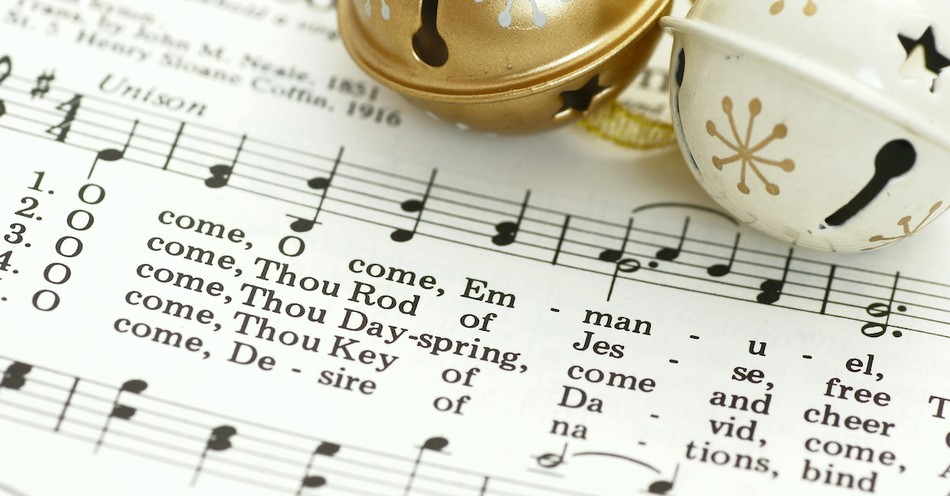Over the past few years, “O Come, O Come Emmanuel” has been the first Christmas hymn I’ve played and sung. I have my own way of playing it on the guitar and singing it in faith gatherings. As a result, the song has become a favorite of my family and friends, too. The haunting melody with hopeful lyrics combine for a powerful song.
Looking deeper into the history and meaning of the song, every believer can find hope today, even in our darkest days.
Who Wrote “O Come, O Come, Emmanuel”?
This beloved Advent hymn doesn’t come from a single writer but rather from liturgical tradition within the early Christian church. The song began with a series of ancient Latin antiphons known as the “O Antiphons.” People sang or changed these during the days leading up to Christmas, usually from December 17th to the 23rd. Each antiphon begins with “O” and focuses on a different name or title for Jesus, highlighting his roles like “Wisdom,” “Root of Jesse,” “Lord,” and “Emmanuel.”
The original text came from anonymous sources, attributed as a whole to the monks who composed these chants. The earliest use of these liturgies dates to the 8th or 9th century. Later, around the 1100s, an unknown monk collected and organized these antiphons into a hymn format, creating a familiar structure for congregants.
The Latin version, "Veni, Veni, Emmanuel," first showed up in a 1790 manuscript. Anglican priest John Mason Neale translated it during the 1800s. Neale, a theologian, desired to preserve and translate ancient Christian texts and hymns. He’s also known for translating “Good Christian Men, Rejoice” and “All Glory, Laud, and Honor.” He translated "Veni, Veni, Emmanuel" into English in 1851 for a wider audience. He altered the lyrics to match a 15th century melody by an English hymnist, Thomas Helmore, creating the tune we know today.
The hymn grew in popularity, particularly among Anglicans and English-speaking churches, ncorporating it into Advent services. By the 20th century, “O Come, O Come, Emmanuel” became an established Christmas song. Today, churches all over the world sing the song since it resonates with all believers to remember Jesus’ coming as a baby two thousand years ago and his return in the future.
What are Biblical Themes of “O Come, O Come, Emmanuel”?
The lyrics of the hymn are as follows:
O come, O come, Emmanuel,
And ransom captive Israel,
That mourns in lonely exile here,
Until the Son of God appear.
Rejoice! Rejoice! Emmanuel
Shall come to thee, O Israel.O come, Thou Rod of Jesse, free
Thine own from Satan's tyranny;
From depths of hell Thy people save,
And give them victory o'er the grave.
Rejoice! Rejoice! Emmanuel
Shall come to thee, O Israel.O come, Thou Dayspring, from on high,
And cheer us by Thy drawing nigh;
Disperse the gloomy clouds of night,
And death's dark shadows put to flight.
Rejoice! Rejoice! Emmanuel
Shall come to thee, O Israel.O come, Thou Key of David, come
And open wide our heav'nly home;
Make safe the way that leads on high,
And close the path to misery.
Rejoice! Rejoice! Emmanuel
Shall come to thee, O Israel.O come, Adonai, Lord of might,
Who to Thy tribes, on Sinai's height,
In ancient times didst give the law
In cloud and majesty and awe.
Rejoice! Rejoice! Emmanuel
Shall come to thee, O Israel.
The name “Emmanuel” means “God with us,” a promise from the prophet Isaiah (7:14): "The virgin will conceive and give birth to a son, and will call him Emmanuel.” The name reveals God’s presence with his people, a powerful theme in the Bible, starting with Israel in the Old Testament. The Tabernacle (later, the Temple) and the priests provided a way for God to dwell within a nation, his chosen Israel. Isaiah declares a new manifestation of God’s presence will come in the future through a virgin giving birth, a supernatural event. Jesus fulfills this promise in a new, more complete way by coming as God in human form, and Matthew 1:23 calls him “Immanuel.”
The hymn connects the Old and New Testament, expressing the longing of Israel for a deliverer, the Son of David, to free them from oppression and slavery. Prophets like Isaiah, Micah, and Zechariah give specific oracles about the Christ, looking forward to a ruler from Bethlehem who would shepherd and guard God’s people (Micah 5:2-4). The hymn’s refrain—“Rejoice! Rejoice! Emmanuel shall come to thee, O Israel”—gives voice to the Old Testament hope found in the Messiah, the Lord Jesus Christ.
Each verse highlights a different name for the Messiah, drawn from the ancient “O Antiphons.” “Wisdom” recalls the spirit of wisdom which rests upon the Messiah, guiding believers in truth and righteousness (Isaiah 11:2). “Root of Jesse” also comes from Isaiah, where the writer speaks of a shoot from the stump of Jesse, King David and the royal line (Isaiah 11:1), through whom the nations find hope (Romans 15:12), also fulfilling the Abrahamic promise to bless all nations through his Seed, Christ (Galatians 3:29).
“O Come, O Come, Emmanuel” reminds Christians that, like Israel waited for a Savior, we await Jesus’ promised return (John 14:3).
How Do the Lyrics of “O Come, O Come, Emmanuel” Connect with Christmas?
As an Advent hymn, “O Come, O Come, Emmanuel” articulates the original hope in the coming Messiah and the modern anticipation before the Christmas holiday and celebration. Each stanza describes a different name for Christ, rooting the song in Old Testament prophecy and the fulfillment within Jesus’ identity and mission. Each title expands and deepens the meaning of Jesus’ arrival as a baby.
One of the hymn's main themes includes liberation, as it pleads for Emmanuel to “ransom captive Israel.” From the time of Jeremiah to the days of Jesus and beyond, the Jews endured oppression from one Empire to another—Babylon to Greece to Rome. From all the Old Testament promises about a land and a king, the Jews sought relief and victory in political form. However, Jesus came to give a deeper, inner freedom that transcends the political. Christ’s freedom is eternal and complete. A temporary political, worldly freedom can be lost again. An eternal liberty remains through all situations and circumstances.
Jesus brought release from the bondage of sin and death (Luke 4:18). Christmas celebrates his liberating purpose, redeeming all of humanity and offering eternal life to all people, not just the Jews (John 3:16). Therefore, the song’s lyrics remind us about the birth and God’s ultimate redemptive story.
Each verse also recounts hope within waiting for God’s intervention. While we have the fullness of God in Christ, Christians also endure hardships in grace and hope for Jesus’ second coming (Titus 2:13).
What are the Ways Christians Use “O Come, O Come, Emmanuel” in Praise and Worship?
In many churches, this hymn opens or closes Advent services, the haunting melody and powerful lyrics creating a hopeful, reflective atmosphere for the congregation. “O Come, O Come, Emmanuel” has become extremely popular, not only in traditional settings but across all Christian denominations and orthodoxies, and has become a seasonal standard even in contemporary worship. As more modern evangelical churches have begun celebrating Advent with more intention, trying to connect with Christian history, “O Come, O Come, Emmanuel” has become a central song in praise and worship gatherings.
Today, various Christian artists, from classical choirs to contemporary worship bands, have adapted and performed this hymn. In a culture where Christmas often focuses on money and commercialism, the hymn reminds us on the important reality of relationship with Christ, helping us praise God for sending his Son so we could be reconciled unto him and enjoy all the benefits through Emmanuel, God with us.
What Can Christians Learn from O Come, O Come Emmanuel?
Although commonly sung during Christmas, the hymn’s message transcends the season because of its subject, the eternal Christ. “O Come, O Come, Emmanuel speaks of our deep yearning for God with us, a desire for every moment of every day.
God consistently pursues reconciliation. After Adam and Eve’s fall, God immediately promised redemption. Genesis 3:15 prophesies the coming Savior, saying the “seed” of the woman would crush the serpent’s head, revealing how Christ would win over sin and death. Even in our brokenness, God’s heart moved to restore us. He didn’t abandon humanity. Instead, he set a plan in motion to redeem all of us through Jesus. This hymn communicates God’s love and compassion.
In the hymn, God’s love is central. God is love (1 John 4:8), and his ultimate gift of love is his presence with us through Jesus. God’s desire has always been to be near his people. “O Come, O Come, Emmanuel” invites us to think about God’s presence in our lives, not just during Christmas but every day. Emmanuel forgave our sins to restore us to eternal relationship.
The hymn reminds us to explore Jesus’ names and titles throughout Scripture, as the verses focus on different aspects like “Dayspring” and “Rod of Jesse.” These names reveal more of his character and mission, all parts of a whole—Jesus as Savior, King, Redeemer, and more.
For those going through hard times, the hymn reminds us that God always keeps his promises, even in our most difficult seasons. When we face struggles and long for change, the song leads us to how God has fulfilled his promises through Christ in the past and will fulfill his future promises, also through Jesus. He is the beginning and the end. As God sent Emmanuel to save us, he will also bring us through our trials, helping us persevere with hope.
The Bible teaches that “He who promised is faithful” (Hebrews 1023), and God’s plan brings us to an ultimate good (Romans 8:28). We may long for heaven and relief, but this hymn shows us God’s history of faithfulness and reminds us that he will show his goodness in the future. All we must do is stay with him through Emmanuel.
Peace.
Photo credit: ©GettyImages/MKucova


_638919941832670018.jpg)

%20(5).jpg)
